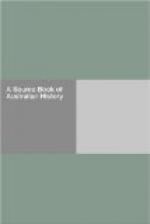Mr. Speaker, I cannot conclude without expressing my grateful sense of the compliment which the House has paid me, in listening with such marked attention to an address extended to an unusual length upon a subject admitted to be dry and unexciting.
I propose, it is true, a sweeping measure of reform, yet not more thorough than the nature of the case imperatively demands. In this view, I am again borne out by the high authority of Lord Brougham, who, in a speech which I have before quoted, thus expresses himself: “The present system has grown out of ingenious devices to evade the oppressions of feudal tyrants, but under it we are subject to the tyranny of the legal profession, and burdens little less grievous. The reform, to be effectual, must be thorough. Delenda est Carthaga must be our motto.”
THE LAND QUESTION IN NEW SOUTH WALES
+Source.+—Fifty Years in the Making of Australian History (Sir Henry Parkes, 1892), pp. 70-71, 81-90, 148, 153
On July 3, 1855, I, (Sir Henry Parkes) moved for the “appointment of a Select Committee to enquire into the state of agriculture, with special reference to the raising of wheaten grain, and to the causes of hindrance or failure in that pursuit, whether arising from the habits of the people, the policy of the Government, or the physical character of the country.” To understand the interest that fairly attached to my motion, we must review, or rather glance at, the state of the colony. The colony still included the whole of Queensland, and embraced an area of 978,315 square miles. Men of leading positions with seats in the Legislature, described it for the most part, as incapable of tillage, and only fit for grazing sheep and cattle, and for “nomadic tribes.” A population not numbering more than 277,579 souls imported largely its breadstuffs from South America and other foreign countries. It is now well known that in all divisions of the colony—north, south, or west—there are as rich wheat lands as in any part of the world; but then the mass of the population were densely ignorant of the true character of the country, and those who knew better, were in too many instances personally interested in keeping them ignorant. The stories that were told of the fruitless endeavours of industrious men to obtain patches of land for a freehold home under the Order-in-Council seem, to the present generation, like cruel bits of romance.
APPENDIX TO EVIDENCE OF MR. J. ROBERTSON (before Select Committee.)
On entering upon the subject under enquiry by the Committee, it is my purpose to assume that the state of agriculture in general, and of wheat culture in particular in the colony, is exceedingly unsatisfactory, and, if not absolutely declining instead of progressing, is at least so with reference to population. The causes of hindrance or failure of agriculture generally, and of the raising of wheat, in particular, I take to be the first and greatest, that for many years the policy of the Government of the colony, whatever may have been its object, has unquestionably tended not only to check the formation of new agriculture establishments, but to depress existing ones.




